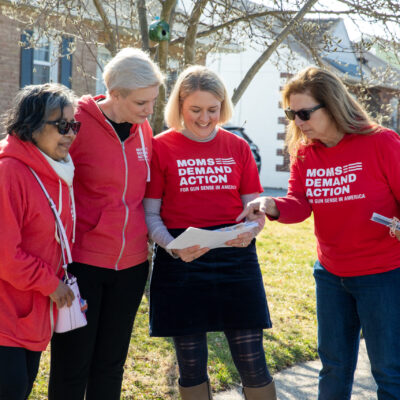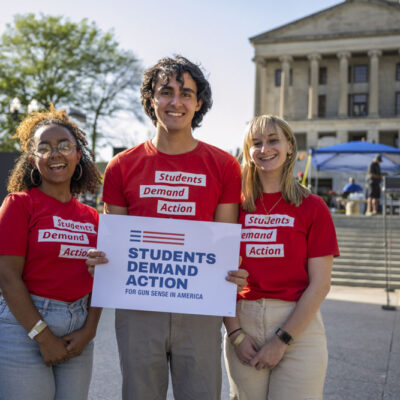Landmark Study Debunks Gun Lobby Myth That More Guns Make Us Safer
10.24.2017
As the gun lobby doubles down on its effort to pass its number one priority to gut state concealed carry standards through national “concealed carry reciprocity,” a new study in the American Journal of Public Health finds that weaker concealed carry laws – which block law enforcement from stopping people with dangerous red flags from carrying handguns – are associated with significantly higher rates of firearm homicide.
“Researchers from the Boston University School of Public Health compared homicide rates from 1991 to 2015 in states where law enforcement has wide discretion to reject concealed carry permits, which they call “may-issue” states, with those of states in which permits must be issued if an individual meets the necessary criteria, referred to as “shall-issue” or “right-to-carry” states.
“They found that [the weaker] states were associated with 8.6 percent higher firearm homicide rates and 10.6 percent higher handgun homicide rates. The study suggests that allowing law enforcement the discretion to reject applicants may save lives.”
This research follows on critical work from earlier this year out of Stanford University that used a different methodology to come to a similarly startling conclusion: When states weaken law enforcement’s authority to deny permits to people who pose a danger, violent crime rates rise by 13-15 percent over what would have been expected without the change.
The American Journal of Public Health article was published online as the gun lobby hopes to weaken state laws across the country through federal legislation that would override each state’s gun laws and make our communities less safe. According to a new report by Associated Press, “The National Rifle Association insists that the recent shooting [in Las Vegas] has not softened its support for any its 2017 legislative priorities,” including concealed carry reciprocity. In fact, the gun lobby has repeatedly called for Congress to pass concealed carry reciprocity since the Las Vegas mass shooting, even while opposing legislative action to prohibit bump stocks. A spokeswoman for the NRA’s lobbying arm told the AP that the legislation “remains the NRA’s top legislative priority.”
There is a wide variety of concealed carry standards across the 50 states. For example, 38 states require a person to get a permit (and background check) to carry a concealed handgun, but a dozen states don’t even require a permit for a person to carry a hidden, loaded gun in public. Since 2013, the gun lobby has worked against law enforcement and the public opinion to dismantle eight states’ concealed carry permit requirements. States also vary in their gun safety training requirements (19 states do not require basic gun safety training) and which criminal convictions disqualify a person from carrying (23 states do not prohibit people who have been convicted of violent misdemeanor crimes).
Concealed carry reciprocity would not create a national standard for who can carry a concealed gun in public. Instead, it would make Americans less safe, as states would be forced to recognize the concealed carry standards of every other state, no matter how weak (or nonexistent) those standards. In other words, it would make the weakest link the law of the land and force states to allow concealed carry by many domestic abusers, convicted stalkers and people with violent histories.
From our nation’s law enforcement to mayors, opposition to concealed carry reciprocity is widespread. Just yesterday, a group of seventeen attorneys general published a letter opposing the policy. The National Law Enforcement Partnership to Prevent Gun Violence, which includes many of the nation’s largest law enforcement organizations, and the bipartisan U.S. Conference of Mayors have also opposed concealed carry reciprocity.
The American people are against it, too. A Pew survey released in June found that 81 percent of Americans oppose allowing people to carry concealed weapons without a permit — a consequence that would result from passage of concealed carry reciprocity.
More information about the proposed legislation is available here. If you have additional questions about this dangerous legislation, don’t hesitate to reach out.
###




